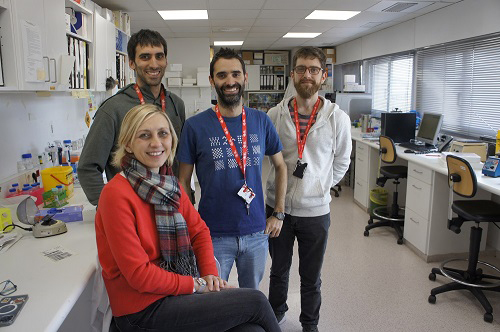Researchers identify an epigenetic signature associated with GATA2 deficiency, a rare genetic disorder

A study published in the journal Haematologica describes an additional level of gene regulation associated with the evolution of GATA2 deficiency, a rare genetic disorder that can have haematological clinical manifestations such as a type of leukemia. The study characterized the genome and the epigenome of patients with this GATA2 gen hereditary mutation and it identified a specific pattern of DNA methylation. The study is led by Alessandra Giorgetti, adjunct lecturer at the Faculty of Medicine and Health Sciences of the University of Barcelona and head of the IDIBELL group on Haematopoietic Stem Cell Biology and Leukemogenesis.

A study published in the journal Haematologica describes an additional level of gene regulation associated with the evolution of GATA2 deficiency, a rare genetic disorder that can have haematological clinical manifestations such as a type of leukemia. The study characterized the genome and the epigenome of patients with this GATA2 gen hereditary mutation and it identified a specific pattern of DNA methylation. The study is led by Alessandra Giorgetti, adjunct lecturer at the Faculty of Medicine and Health Sciences of the University of Barcelona and head of the IDIBELL group on Haematopoietic Stem Cell Biology and Leukemogenesis.
GATA2: alterations in the genic expression
DNA methylation is a natural process that modifies the genome by adding chemical tags to certain regions. These tags can activate and deactivate the genes, which affects cell function. The team found that, in individuals with mutations in the GATA2 gene, some regions of the DNA were abnormally methylated, and this could explain the evolution of the disease towards severe clinical manifestations.
The study focused on the analysis of DNA samples taken from twenty carriers of GATA2 and from eight healthy individuals. The researchers, also members of the Program for Clinical Translation of Regenerative Medicine (P-CMR[C]), used advanced sequencing technologies to map the epigenetic changes in the DNA, and they created a detailed profile of each individual’s epigenome.
“For many years, translational and clinical researchers have focused on the characterization of DNA mutations in specific genes associated with the disease; however, we cannot ignore that the alterations in the genic expression and the epigenetic changes can have an impact on their progress”, notes Oskar Marín Béjar, Marie Skłodowska-Curie postdoctoral researcher at IDIBELL and first author of the study.
When comparing the epigenome of both groups, the team identified a specific DNA methylation associated with GATA2 deficiency, which could be used in the future for an early and more precise diagnosis of the clinical evolution of this protein deficiency.
The study provides relevant data on the underlying mechanisms of the GATA2 deficiency and it highlights the potential of the characterization of the epigenome as an analytical tool for genetic disorders. Regarding future research studies, this methodology could help doctors in the diagnostic process and in making decisions about the best treatment for rare diseases such as GATA2 deficiency, but also for more common diseases with an early genetic episode, such as cancer.
The project has been a collaboration effort between the Pisana Foundation for Science ONLUS, the GATA2-HuMo consortium, GESMED, and the Josep Carreras Leukaemia Research Institute, among others, with the support from funding agencies, specially ERA PerMed and the initial grant from the European Haematology Association (EHA).
Reference article:
Marin-Bejar, 0.; Romero-Moya, D.; Rodríguez-Ubreva, J. et al. “Epigenome profiling reveals aberrant DNA methylation signature in GATA2 deficiency”. Haematologica, February 2023. Doi: 10.3324/haematol.2022.282305
